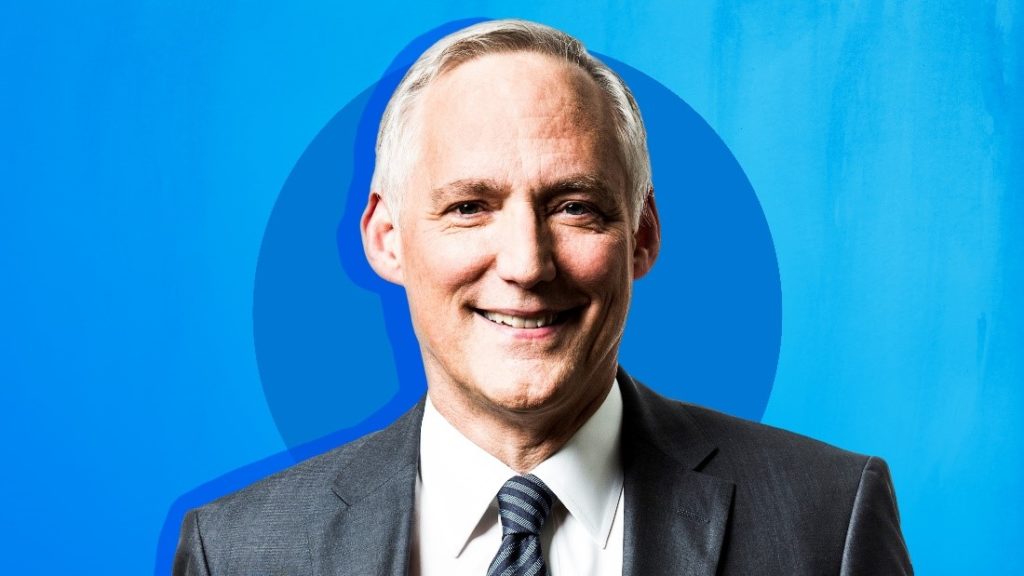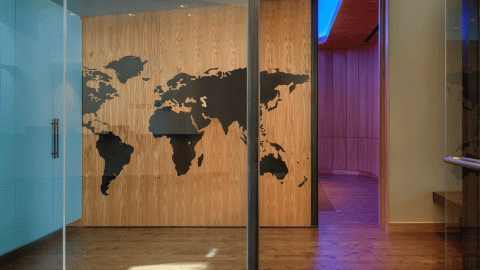Why does Microsoft have an office at the UN? A Q&A with the company’s UN lead
In January, Microsoft announced it was setting up a United Nations Affairs office in New York City. The team is looking to deepen its work with the UN and identify new projects to advance global multi-stakeholder action on key technology, environmental, humanitarian, development and security goals as well as helping to advance the UN Sustainable Development Goals.
The new team was officially introduced at the beginning of High-level week – the opening of the 75th Session of the UN General Assembly – and we had a chance to connect with John Frank, Vice President of UN Affairs, who leads the team. Below is our conversation, edited for length.
Let’s start at the top: What was behind the idea of having a UN affairs office?
Increasingly, as a company, we’ve been working on global issues. In this 75th UN General Assembly, we are committed to collaborating to advance seven priorities: human rights, defending democracy, economic growth, education, broadband, environmental sustainability and digital empowerment of the UN itself. At the end of the day, they all roll up to global governance. And, so, it makes sense that the United Nations plays a special role in these issues. We decided we wanted to have a team in both New York and Geneva focused on the UN year-round since these priorities are year-round. The vision for our UN Affairs team is to engage with the UN community, build relationships and learn, and help make Microsoft’s partnerships more impactful.
Why does it make sense for Microsoft as a corporation, as a private entity, to have this office?
We think multi-stakeholderism is key. Companies ought to be showing up. Not just to talk about policy, but to work on projects together. It’s the kind of collaboration that we’ve done with government and other companies on the Paris Call for Trust and Security in Cyberspace and the Christchurch Call. We believe this is the best model for tackling big problems.
[READ MORE: Microsoft and United Nations: What to watch]
Establishing our representation office with people based in New York and Geneva is the next natural step for a company that values multilateralism and multi-stakeholder solutions to global challenges.
Microsoft just concluded its first High-Level Week. How did it go? What did you learn?
First, let me just say that Microsoft has participated for multiple years now at UNGA. This year was the most unusual in light of COVID because almost all the meetings that would normally take place in person happened virtually. Overall, our partners, whether from the UN, the Permanent Missions to the UN, or civil society – and even the City of New York – were excited about Microsoft increasing its presence and growing its engagement with the UN. I see great potential for further collaboration on the horizon – and this week was a great kickstart to these relationships.
One of my most significant learnings from the week is a renewed and deep appreciation for the progress that my colleagues on the Tech for Social Impact team have made in helping empower UN organizations with computer and data science. They are helping the UN to not only digitally transform internal UN agencies and offices, but also to deliver the digital means required for the UN to execute on its own mission to build inclusive and prosperous societies. If the UN is empowered to do more, that means we can help more people in need around the world and better protect our planet.
Talk us through the structure of the work? Who are you interfacing with?
There’s the leadership of the United Nations and its agencies. For example – the UN Development Programme team. We’ve been talking about how to build our collaboration there and will be making an announcement about that.
Another example is our work with the President of the General Assembly’s office, where we are talking with them about how to use technology to help them run the General Assembly in an essentially virtual way along with the International Telecommunication Union in Geneva.
And finally, there’s a wide range of activities that Microsoft has been engaging with the UN for a long time on. And we’re bringing more energy and raising the level of engagement to a higher political level.
I don’t think any other company has set up an office like this, so I think we’re the first. I do think we’re pioneering this.
Is it fair to describe Microsoft as a partner to the United Nations?
Yes, we aspire to that. We’re not a government; we don’t pretend to be. There are some things that we don’t get invited to, but there are things that we can help with.
It’s fine to be able to talk about things, but we’ve got the capacity and the internal operational support to actually go do things. Also, bringing together a coalition of other companies to talk about how we can learn together is really important and can broaden impact around the world.
How has your former experience as vice president of European Affairs helped create the relationships you have today?
The European Union operates with national governments as a multilateral institution, the European Commission, Council and Parliament. So, I feel quite comfortable working with the political leadership of the United Nations, as well as ambassadors and their delegations and their national governments. The configuration is familiar, but the great part of the UN is that you have representation from all corners of the globe, countries big and small, young and old, all in New York engaging with the UN.
Can you speak a little bit about the UN’s role, how it’s changing, and the part Microsoft might play?
Well, I don’t think any other company has set up an office like this, so I think we’re the first. I do think we’re pioneering this.
One of the goals for us is how do we help the UN make its projects more successful. That’s where I see the really interesting capacity. You need national governments to support those things, and so I think the ability to engage with national governments at the UN is great.
What does success look like from your point of view, as this office is being set up?
Working closely with our Tech for Social Impact team, for one. We’d like to very much see the UN achieve more through the most advanced computer and data science.
We also want to participate, and bring other companies and civil society groups with us, in building solutions to address our pressing global challenges – public health, climate, and digital skills and inclusive economic recovery.
[READ MORE: Our interconnected world requires collective action]
In a sense, the scope of action becomes broader with success, and so that’s not something that just our team can do. There are several teams across Microsoft, each with people passionate about their UN projects, that are part of that, and we hope even more people at Microsoft will become part of those activities.
Why is it also important that Microsoft does work with the UN?
The biggest challenges facing our society can’t be fixed by governments alone. It can’t be fixed by the private sector alone. Or civil society alone. We need to work together if we’re going to address these them.
We need to address climate change. We need to make cyberspace more secure. We need a more inclusive digital world where more people have access to broadband and digital skills. We’re not going to be able to fix those kinds of big issues unless we all work together. So, part of this is showing up. We’re saying let us help, but let us all get smarter about how we can work together more effectively because we are not succeeding so far on these [issues] as a species and it’s a big challenge for us.
For example, the UN and its agencies have been on a similar journey, researching and learning more about how to tackle climate change collectively. With our engagements with the UN, we hope that we can expand the reach and amplify the learnings on how organizations, large and small, can move from aspiration to achieving measurable and ambitious operational goals.
Learn more on the Microsoft UN Affairs site and follow @MSFTIssues on Twitter.








